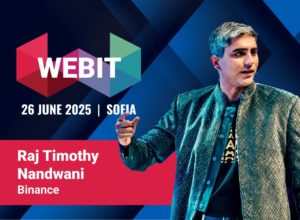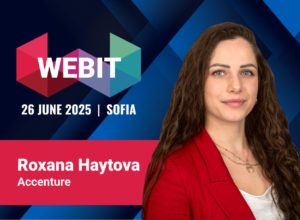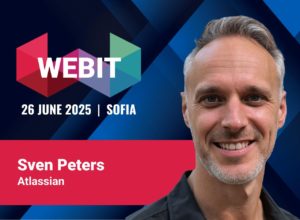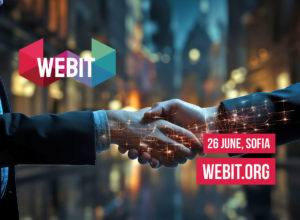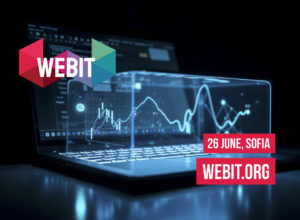We’re excited to welcome Raj Timothy Nandwani, Binance, to Webit 2025...
Raj is a powerhouse in the crypto and digital asset space, driving hashtag#Web3's global expansion through strategic partnerships, high-impact dealmaking, and bold business development.
With over a decade of experience shaping #fintech and #blockchain ecosystems, he’s helping to transform how the world interacts with digital finance.
At Binance, Raj leads initiatives that push the boundaries of innovation, from advisory and investment strategies to capacity building and thematic research. His work is redefining the future of financial infrastructure and decentralised technologies.
🔥 At Webit, Raj will bring deep insights into the evolution of hashtag#Web3 and the real-world impact of blockchain adoption.
🎟 This is an exclusive, invitation-only event, with only 50 public tickets available. If you want to be part of shaping the future, this is your moment.
👉 https://lnkd.in/dkRHJ9mn
#Webit2025 CryptoLeadership #Web3 #BlockchainInnovation #FintechFuture #Binance#DigitalAssets #TechTransformation
We’re excited to announce Martin Bakardzhiev, Visa Consulting Services, as a...
At the forefront of digital payments, Martin leads Visa’s consulting initiatives in Bulgaria while driving #cybersecurity and fraud prevention across Central and Eastern Europe.
With a background in top-tier companies like PwC and Crypto. com, and academic roots stretching from Lancaster to Groningen (with a PhD in progress), Martin blends strategic insight, financial acumen, and deep expertise in digital risk.
Martin joins a stellar lineup of speakers at Webit — and more are coming soon!
🎟️ This is an exclusive, invitation-only event, with only 50 public tickets available. If you want to be part of shaping the future, this is your moment.
https://www.webit.org/2025/sofia/tickets.php
#Webit2025 #Fintech #Cybersecurity #DigitalPayments #Visa #FinanceInnovation #WebitSpeakers
We’re excited to welcome Brent Summers, Qualcomm Technologies to the stage...
We’re excited to welcome Brent Summers, Qualcomm Technologies to the stage at #Webit2025 in Sofia!
Brent brings a unique combination of UX expertise, #B2B marketing know-how, and a forward-thinking approach to #AI, helping enterprises embrace Account-Based Marketing (ABM) and #GenerativeAI to fuel scalable growth.
🎟️ This is an exclusive, invitation-only event, with only 50 public tickets available. If you want to be where the future is shaped, this is your moment:
👉 https://webit.org/2025/sofia/
#Webit2025 #AIinMarketing #B2BInnovation #GTMLeadership #AccountBasedMarketing #GenerativeAI #Qualcomm #TechForGrowth #DigitalTransformation
Please welcome Roxana Haytova, Accenture, to the speaker lineup for Webit...
Roxana is at the forefront of workforce transformation through GenAI and low-code solutions, helping public and health sector organisations turn cutting-edge tech into real-world impact. 🚀💼
With an MSc in Digital Technology Solutions and a spot as a hashtag#2024WomeninTechExcellence Awards finalist, Roxana has also been named one of the hashtag#Top50BulgarianTech Leaders in the UK for her contributions to AI innovation and inclusive digital progress 💡👩💻- Bridging the gap between tech potential and human possibility — and empowering organizations to adopt AI with purpose and confidence.
🎟 Don’t miss out - This exclusive event is accessible by invitation only, with a limited number of 50 tickets available to the public.
👉 https://webit.org/2025/sofia/tickets.php
#Webit2025 #WomenInTech #AIInnovation #GenAI #Accenture #DigitalTransformation #TechForGood #FutureOfWork #AILeadership
We proudly welcome Tim Bond, Ipsos, to Webit 2025 in Sofia!
With over 15 years of experience at the crossroads of data, media, marketing, and technology, Tim is a trusted voice in turning insight into action.
A social scientist by background, he’s led research that helps some of the world’s biggest media and tech brands make smarter, audience-focused decisions.
From exploring the future of sustainability to decoding the metaverse, Tim's work reveals the trends shaping tomorrow’s digital landscape — and how businesses can stay ahead.
Tim joins a growing lineup of brilliant minds at Webit — more announcements coming soon!
🎟 This is an invitation-only event, with just 50 tickets available for industry leaders:
https://www.webit.org/2025/sofia/tickets.php
#Webit2025 #DataDriven #MarketingInsights #FutureOfMedia #Ipsos #TechResearch #Innovation #AudienceIntelligence #WebitSpeakers
Webit 2025: Where Technology, Business, and Human Potential Converge
Dimitar Berbatov to Deliver an Exclusive Masterclass at Webit 2025:
"Leadership and Success in the New Tech Era – My Way"
June 26, 2025 | National Palace of Culture, Sofia, Bulgaria
Sofia will once again become the epicenter of innovation and global dialogue as it hosts Webit 2025, the leading platform for innovation, AI, and Web3 in the region.
This year’s edition promises to be one of the most inspiring yet, featuring a special keynote Masterclass by Dimitar Berbatov – globally acclaimed Bulgarian football legend, thought leader, and author.
Titled “Leadership, Discipline & Success – My Way”, the Masterclass will take attendees on a motivational journey through the mindset, habits, and values that shape sustainable success – not only in sports, but in life and business. Drawing insights from his best-selling book, Berbatov will share how to cultivate a winner’s mentality, maintain self-discipline, and lead authentically from within.
This session is specially designed for business leaders, entrepreneurs, innovators, young professionals, and anyone striving to achieve long-term personal and professional growth.
 Webit 2025: Technology, Business & Humanity in the Age of AI and Web3
Under the theme “Business, Technology & People in the Era of AI and Web3,” Webit 2025 will convene world leaders, visionaries, and thousands of participants to explore how artificial intelligence, decentralized technologies, and purpose-driven leadership are reshaping industries, organizations, and society at large.
Webit is more than just a conference – it is a global movement where bold ideas, breakthrough technology, and the power of the human spirit come together to shape the future.
Key topics at Webit 2025 include:
Webit 2025: Technology, Business & Humanity in the Age of AI and Web3
Under the theme “Business, Technology & People in the Era of AI and Web3,” Webit 2025 will convene world leaders, visionaries, and thousands of participants to explore how artificial intelligence, decentralized technologies, and purpose-driven leadership are reshaping industries, organizations, and society at large.
Webit is more than just a conference – it is a global movement where bold ideas, breakthrough technology, and the power of the human spirit come together to shape the future.
Key topics at Webit 2025 include:
 Webit 2025: Technology, Business & Humanity in the Age of AI and Web3
Under the theme “Business, Technology & People in the Era of AI and Web3,” Webit 2025 will convene world leaders, visionaries, and thousands of participants to explore how artificial intelligence, decentralized technologies, and purpose-driven leadership are reshaping industries, organizations, and society at large.
Webit is more than just a conference – it is a global movement where bold ideas, breakthrough technology, and the power of the human spirit come together to shape the future.
Key topics at Webit 2025 include:
Webit 2025: Technology, Business & Humanity in the Age of AI and Web3
Under the theme “Business, Technology & People in the Era of AI and Web3,” Webit 2025 will convene world leaders, visionaries, and thousands of participants to explore how artificial intelligence, decentralized technologies, and purpose-driven leadership are reshaping industries, organizations, and society at large.
Webit is more than just a conference – it is a global movement where bold ideas, breakthrough technology, and the power of the human spirit come together to shape the future.
Key topics at Webit 2025 include:
- Human-AI collaboration: Building effective AI-powered teams
- AI-driven transformation in commerce and fintech
- AI in ERP/EPM systems for strategic planning and optimization
- Public-private partnerships for secure AI innovation and local economic growth
- AI agents as 24/7 digital colleagues in the workplace
- AI-powered marketing and hyper-personalization
- Intuitive design and UX in AI applications
- Education 3.0 and NFT-based learning models
- AI in personalized learning and cognitive flexibility development
- AI in healthcare and longevity technologies
- Cybersecurity in the age of intelligent threats
We’re excited to welcome Sven Peters, Atlassian, to Webit 2025 in...
For over 15 years, Sven has explored what makes high-performing teams tick — from cultural habits to cutting-edge tech practices.
At Atlassian, he champions modern working methods that boost collaboration, spark innovation, and reimagine how we work.
Through his engaging talks and hands-on experience, Sven empowers organisations to build thriving team cultures that are fit for the future.
He’s one of many inspiring voices you’ll hear at Webit — stay tuned for more speaker reveals!
🎟 The event is invitation-only, and just 50 tickets for industry leaders are available:
https://www.webit.org/2025/sofia/tickets.php
#Webit2025 #TeamCulture #FutureOfWork #Innovation #TechLeadership #Atlassian #ModernWork #WebitSpeakers
Shaping a Responsible AI Future for Business: Trust, Ethics, and...
As artificial intelligence (AI) becomes deeply woven into the fabric of modern business, its transformative potential is clearer than ever. From automating operations to enhancing customer experiences and accelerating strategic decisions, AI is unlocking new levels of productivity and innovation. But with great power comes great responsibility.
To ensure AI delivers long-term value, businesses must secure its future—not just in terms of infrastructure, but through a lens of trust, ethics, governance, and resilience.
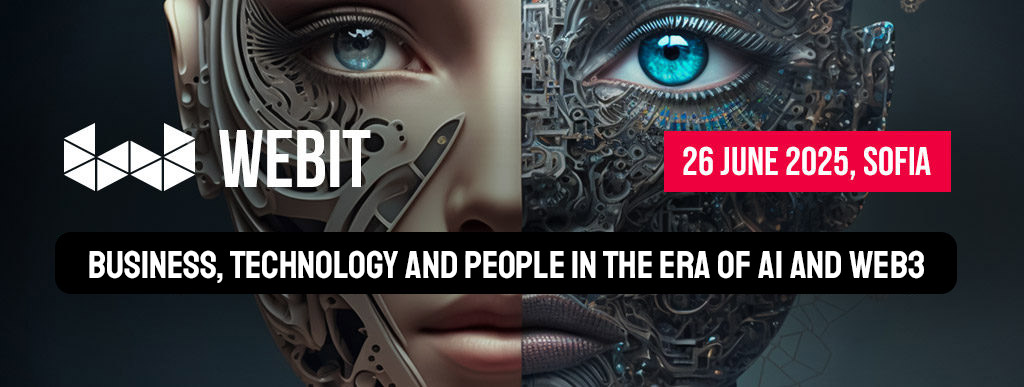
The Trust Imperative
Trust is the currency of successful AI adoption. Whether it’s customers, employees, or stakeholders, people need to trust that AI systems are fair, transparent, and reliable.- Transparency: Businesses must be able to explain how AI systems arrive at decisions. This is especially important in high-impact areas such as finance, hiring, or healthcare.
- Accountability: Clear ownership and responsibility for AI systems must be established. Who monitors performance? Who intervenes when outcomes go wrong?
- Bias and Fairness: AI models learn from data, and data can carry bias. Businesses need robust processes to detect and mitigate algorithmic bias to avoid perpetuating inequality.
Building Resilient, Responsible AI
AI is not a "set it and forget it" tool. It's a living system that evolves, and must be governed accordingly.- Governance Frameworks: Establish internal AI policies and oversight mechanisms to ensure models are continuously validated, monitored, and updated in line with business goals and regulatory requirements.
- Security by Design: As AI systems become critical infrastructure, they must be protected from cyber threats. Data poisoning, model theft, and adversarial attacks are real risks. Secure coding practices, access controls, and regular audits are essential.
- Data Privacy: As AI relies on vast amounts of data, organizations must prioritize data protection and compliance with regulations like GDPR and CCPA. Consent, anonymization, and minimization should be built into the AI lifecycle.
Culture and Capability: The Human Side of Securing AI
Securing AI’s future also means preparing your people.- Upskilling and Literacy: Employees at all levels should understand the basics of AI—how it works, what it can do, and where it can fail. This promotes better collaboration between technical and business teams.
- Ethical Mindset: Embedding ethical thinking into AI development is key. Encourage multidisciplinary teams to ask not just can we do this, but should we?
- Leadership Buy-In: Executive sponsorship is critical to drive responsible AI initiatives, enforce standards, and invest in sustainable infrastructure.
Preparing for the Road Ahead
As regulatory bodies around the world begin defining rules for AI use—such as the EU AI Act—organizations must stay ahead of the curve. Proactive compliance, ethical foresight, and transparent practices will differentiate the leaders from the laggards. The future of AI in business isn't just about what AI can do—it's about what it should do, and how it’s governed along the way. Securing that future means balancing innovation with responsibility. Conclusion: AI’s future in business is bright—but only if it’s built on a foundation of trust, ethics, and security. Organizations that invest in securing their AI systems today will not only reduce risk but also unlock deeper value and long-term competitive advantage. Join the discussion and learn from global leaders in the industry on the 26th of June in Sofia. Webit: “Business, Technology and People in the Era of AI and Web3” is an exciting opportunity for industry leaders and experts to come together to discuss the latest t/festival-europe/index.phprends and developments in the field of Web3 & AI in Business. Check our ticket options here: Business, Technology and People in the era of AI and Web3
We’re excited to announce Hannah Beresford, Boston Consulting Group (BCG), as...
With over a decade of experience in UX research, Hannah brings a unique lens to the intersection of human-centred design and generative AI.
Her work explores how our understanding of AI is evolving — and how this impacts the way we work, collaborate, and innovate.
At companies like Deloitte and now #BCG, she has led groundbreaking research and transformation efforts that put user experience at the heart of AI adoption, reshaping workflows for thousands of professionals.
🎟 Attendance is by invitation only, with just 200 tickets available for industry leaders:
https://www.webit.org/2025/sofia/tickets.php
#Webit2025 #UXResearch #HumanCenteredDesign #GenerativeAI#AIandUX #FutureOfWork #Innovation#BCG
The Power of AI in Business Processes for ERP and EPM...
In today's rapidly evolving digital landscape, artificial intelligence (AI) is not just a buzzword — it's a transformative force across industries. One of the most impactful areas where AI is driving significant change is in business processes, particularly within Enterprise Resource Planning (ERP) and Enterprise Performance Management (EPM) practices.

Why AI, and Why Now?
The modern enterprise faces an avalanche of data, increasing operational complexity, and relentless pressure to do more with less. Traditional ERP and EPM systems, while robust, often struggle to keep up with the pace of change. AI steps in as a game-changer — enabling smarter, faster, and more agile business operations.AI in ERP: Automation, Insights, and Accuracy
AI empowers ERP systems by automating routine tasks, identifying patterns, and providing predictive insights. Here’s how:- Automated Data Entry & Validation: AI-powered bots can handle repetitive tasks such as invoice processing, payroll, and inventory updates with minimal human intervention — improving accuracy and freeing up employees for more strategic work.
- Predictive Analytics: Machine learning algorithms analyze historical and real-time data to forecast demand, predict maintenance needs, or flag potential supply chain disruptions before they occur.
- Smart Decision-Making: AI enhances ERP dashboards with intelligent alerts and recommendations, helping leaders make data-driven decisions in real time.
AI in EPM: From Planning to Performance
EPM focuses on planning, budgeting, forecasting, and performance analysis — all areas ripe for AI-driven innovation.- Enhanced Forecasting Accuracy: AI models can ingest vast amounts of structured and unstructured data to improve forecasting precision, helping businesses respond proactively to market shifts.
- Scenario Modeling: Advanced AI tools enable finance teams to simulate various business scenarios with greater accuracy, supporting better strategic planning and resource allocation.
- Anomaly Detection: AI algorithms continuously monitor performance metrics to detect outliers or trends that may signal risks or opportunities, enabling timely intervention.
The Human + AI Partnership
It's important to note that AI doesn’t replace human expertise — it augments it. By handling the heavy lifting of data processing and analysis, AI allows professionals in finance, operations, and planning to focus on high-value activities like strategy development, stakeholder communication, and innovation.Getting Started: Practical Considerations
Organizations looking to integrate AI into their ERP and EPM processes should:- Start with High-Impact Use Cases: Identify repetitive, data-intensive tasks where AI can deliver quick wins.
- Ensure Data Readiness: AI thrives on quality data. Clean, well-structured, and accessible data is essential for successful implementation.
- Invest in Change Management: Adoption depends on user buy-in. Provide training and create a culture of continuous learning.
Looking Ahead
The integration of AI into ERP and EPM practices isn’t a distant vision — it’s happening now. Organizations that embrace this shift will not only operate more efficiently but also gain a significant competitive edge in forecasting, decision-making, and agility. By weaving AI into the fabric of business processes, companies unlock the ability to adapt faster, execute smarter, and deliver value like never before. Join the discussion and learn from global leaders in the industry on the 26th of June in Sofia. Webit: “Business, Technology and People in the Era of AI and Web3” is an exciting opportunity for industry leaders and experts to come together to discuss the latest trends and developments in the field of Web3 & AI in Business & Finance. Check our ticket options here: Business, Technology and People in the era of AI and Web3
